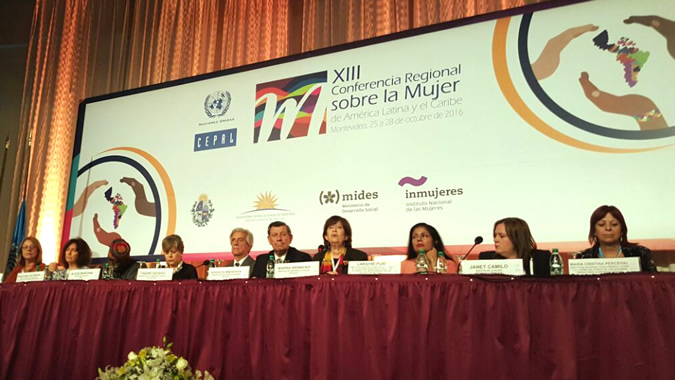XIII Regional Conference on Women Opens with Strong Condemnation of Gender Violence in Latin America and the Caribbean
Work area(s)
The President of Uruguay, Tabaré Vázquez, the Minister of Social Development, Marina Arismendi, and ECLAC’s Executive Secretary, Alicia Bárcena, led the opening session of the inter-governmental conference being held through Friday, October 28 in Montevideo.

Uruguayan authorities and representatives of international organizations present today for the opening of the XIII Regional Conference on Women in Latin America and the Caribbean strongly condemned violence against women in Latin America and the Caribbean. The Conference, organized by the Economic Commission for Latin America and the Caribbean (ECLAC) and the Uruguayan government, is taking place Oct. 25-28 in Montevideo.
The opening session was attended by Tabaré Vázquez, Uruguay’s President; Marina Arismendi, the Minister of Social Development, who spoke on behalf of the government; Alicia Bárcena, ECLAC’s Executive Secretary; Babatunde Osotimehin, Executive Director of the United Nations Population Fund (UNFPA); Lakshmi Puri, Deputy Executive Director of UN Women; Mariella Mazzotti, Director of Uruguay’s National Institute for Women; Janet Camilo, the Dominican Republic’s Minister of Women’s Affairs; María Cristina Perceval, UNICEF’s Regional Director for Latin America and the Caribbean; and María Nieves Rico, Director of ECLAC’s Gender Affairs Division.
Minister Marina Arismendi welcomed the delegations participating in the conference on behalf of Uruguay, and highlighted that nearly 40 years have passed since the first Conference on Women was held in Havana in 1977. “We need countries free of gender violence, free of femicide, free of women’s deaths at the hands of their spouses,” she said during her speech. “There is no sustainable development of humanity if we don’t have gender equality, and ensure that no one is left behind,” she added.
ECLAC’s Executive Secretary, Alicia Bárcena, agreed that “we must put a definitive end to the gender violence that we have witnessed in horror in our countries in recent days. Reality today batters us with scandalous figures of sexist violence in Latin America and the Caribbean, where, on average, 12 women die daily just because they are women. We don’t want to lose even one more woman! It is imperative that we put an end to violence against women!” she stressed.
During her speech, Bárcena addressed the inequalities that women face to exercise not only physical, but also economic and political autonomy. “Today on our continent, poverty still has the face of a woman. For every 100 men in this condition, there are 118 women,” she said, adding that “one third of Latin American women (29%) do not manage to generate their own income and nearly half have no ties to the labor market.”
“To these figures we must add the low level of participation by women in the political arena,” given that their presence does not surpass 30% in decision-making posts in branches of government, she observed.
Babatunde Osotimehin, from UNFPA, recalled that all Latin American and Caribbean countries have adopted the Inter-American Convention on the Prevention, Punishment and Eradication of Violence against Women, known as the Belém do Pará Convention. “We have a facilitating environment; let’s take advantage of it,” said the senior UN official, who warned during her speech of the high adolescent fertility rate in the region. “Girls and adolescents should have access to sexual and reproductive health,” he asserted.
Lakshmi Puri, Deputy Executive Director of UN Women, underscored that “this is the first meeting of the Regional Conference on Women since the approval of the 2030 Agenda for Sustainable Development. The Regional Conferences have played a key role in emphasizing the need for gender equality as a prerequisite for development and justice.” “It is time to firmly uphold the achievements and progress made by women and continue being a progressive global force to irreversibly transform gender relations,” added Puri.
After the opening session and special presentations by representatives of UNFPA and UN Women, Alicia Bárcena presented the main conclusions from the document Equality and women’s autonomy in the sustainable development agenda, prepared by ECLAC as a contribution to the conference. She took comments from Uruguayan Foreign Relations Minister Rodolfo Nin Novoa.
The Foreign Minister gave an overview of some of the progress made in his country on matters of gender equality, such as the National Integrated Health System. With regard to the expected outcome of the conference, Nin Novoa stressed the potential contribution of the Montevideo Strategy being discussed by countries. It could be a “technical and political instrument” for implementing commitments by the countries of the region, he said.
Alicia Bárcena concluded by saying that “today we call upon governments and civil society to join forces, to not let their guard down and to avoid setbacks, because even though important progress has been made, there is still a long road ahead to achieving equality.” “Without gender equality, sustainable development is neither development nor is it sustainable,” she remarked.
The XIII Regional Conference on Women is being attended by delegates from 36 ECLAC Member States and two associate members, in addition to officials from 14 agencies of the UN system and representatives from over 200 civil society organizations and gender affairs specialists.
This Conference on Women is organized by ECLAC and the Uruguayan government, through its Foreign Relations Ministry and the National Institute for Women. It will include a series of thematic panels, roundtables and side events.
Related content
Inauguración de la XIII Conferencia Regional sobre la Mujer de América Latina y el Caribe
Intervención de Alicia Bárcena, Secretaria Ejecutiva de la CEPAL.
Equality and women’s autonomy in the sustainable development agenda
Presentation by Alicia Bárcena, ECLAC Executive Secretary, in the XIII Regional Conference on Women in Latin America and the Caribbean. Montevideo, Uruguay, 25 October 2016.
Country(ies)
- Latin America and the Caribbean
Contact
Public Information Unit
- prensa@cepal.org
- (56 2) 2210 2040
